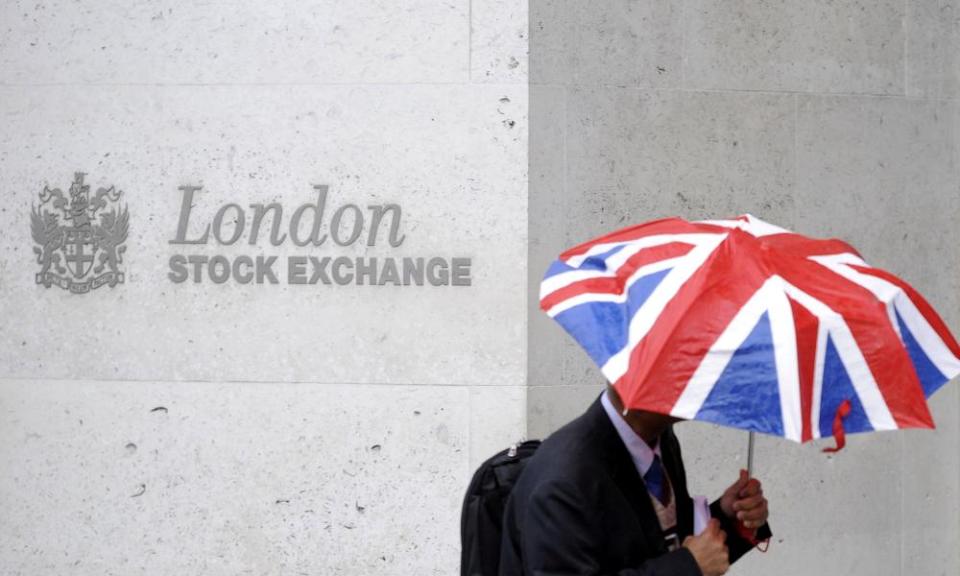FTSE 100 posts biggest fall in more than a month as US dollar surges

The FTSE 100 posted its biggest fall in more than a month on Friday as the prospect of America’s central bank slowing its emergency stimulus package triggered heavy selling across the financial markets.
London’s blue-chip stock market index fell by 136 points, or 1.9%, on Friday to 7017 points, its worst one-day drop since mid-May, and its lowest closing point in a month.
For the week, it lost 1.6%, its worst weekly performance since the end of February, despite hitting a 16-month high on Wednesday.
With the US dollar surging to 10-week highs on the foreign currency exchanges, the pound fell to $1.38, its lowest level since early May. Sterling was on track for its worst week against the dollar since September 2020, with a surprise fall in retail sales across Britain in May also hitting the currency.
European stock markets also posted heavy losses, with Germany’s Dax losing 1.8%, dragging the pan-European Stoxx 600 back from record highs earlier this week.
The Federal Reserve rattled investors’ nerves on Wednesday when most of its officials predicted US interest rates would rise from record lows in 2023, earlier than previously. Several policymakers thought rates would rise as early as next year, to combat rising inflation.
Behold the Fed’s new dot plot: The central bank is mum on tapering but the dot plot (in purple), which signals the path of interest rates, shows it’s definitely more hawkish than before and suggests there could be rate increases by the end of 2023. pic.twitter.com/XalDdNXFR8
— Jurrien Timmer (@TimmerFidelity) June 18, 2021
The central bank also signalled it would soon begin talking about slowing, or tapering, its $120bn-a-month bond purchase programme. This quantitative easing (QE) scheme has been pouring money into the financial system since the early days of the coronavirus pandemic.
This has jolted the markets, threatening to derail the “reflation trade” which has driven up shares in mining companies, oil companies and banks since the rollout of Covid-19 vaccines lifted confidence in the economic recovery.
The engineering firm Melrose led the FTSE 100 fallers, down 5.6%, followed by the mining giant Anglo American, which lost 5% following steep falls in commodity prices. The energy firm Royal Dutch Shell lost 4%, with Barclays bank down 3.9% and the hotel chain Whitbread dropping by 4.5%.
Copper was on track for its worst week since March 2020, pulled down by the stronger dollar and a pledge by Beijing earlier this week to release industrial metals from its national reserves to curb commodity prices.
“The commodity sector is now at the lowest levels in more than six weeks underscoring that consensus is bolstering around the transitory narrative on inflation and growth with the world back to normal by mid-2022,” said Peter Garnry, the head of equity strategy at Saxo Bank.
Stock market losses accelerated after the St Louis Fed president, James Bullard, revealed that he expects the first US interest rate rise to come next year. Bullard said US growth and inflation this year had been higher than forecast, so the Fed was taking a more hawkish view. Investors fear that a US rate rise will lead to a slowdown in the world’s largest economy by raising consumers’ and companies’ borrowing costs, with a knock-on effect for other economies.
“We’re expecting a good year, a good reopening. But this is a bigger year than we were expecting, more inflation than we were expecting,” Bullard told CNBC’s Squawk Box show.
“I think it’s natural that we’ve tilted a little bit more hawkish here to contain inflationary pressures,” he added.
Bullard’s comments helped to send stocks lower in New York, where the Dow Jones industrial average was down more than 1% at lunchtime, and heading for its worst week since January.
Fawad Razaqzada, an analyst at Think Markets, said risk assets suffered from a “mini taper tantrum”.
“Investors fear that with inflation rising rapidly, QE might be tapered sooner than expected,” he said.

 Yahoo Finance
Yahoo Finance 